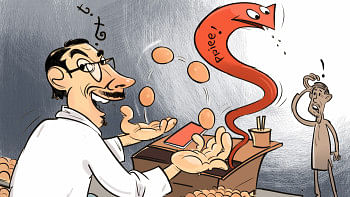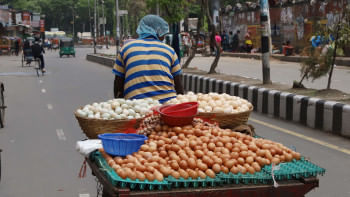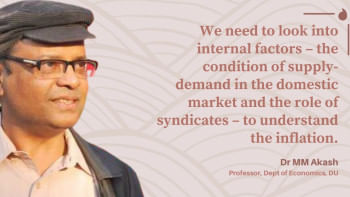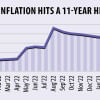How potato prices are manipulated

The price of potatoes, long considered a cheap vegetable, has now risen beyond the reach of the poor. This year, potato price has increased to such an extent that it has broken all previous records. Potatoes are now being sold at Tk 65-70 per kg in the retail market of Dhaka.
The potato market has been volatile for almost two months. Earlier in September, the government fixed the price at Tk 26-27 per kg at the cold storage level, and at Tk 35-36 per kg for retail. But kitchen markets were found defying the fixed prices. On the one hand, the government claimed that there had been a record production of potatoes this year and decided to export the produce. But on the other hand, unable to control the price on the local market, the government has now decided to import potatoes. The question is: if production is higher than demand, how has the price of potatoes increased to a record amount? And why did the authorities decide to import potatoes?
In reality, potato prices do not increase by much during the harvesting season, when the potatoes are mostly in the farmers' possession. The price starts increasing from the month of July, when most of the potatoes have reached the traders, who purchase them through faria from the farmers. The traders who buy potatoes from farmers at Tk 10-12 per kg during March-June sell the vegetable at much higher prices after keeping them in the cold storage for some time.
At present, to stabilise potato prices, the government should establish an agricultural price commission and set maximum and minimum support prices for potatoes, remove ambiguity in terms of production, demand, supply and price data, monitor prices and ensure the release of potatoes from cold storages, and broadcast the correct scenario of the potato market using data in order to counter rumours.
How much does it cost the traders to keep potatoes in the cold storage? The cost of keeping a bag of 50kg potatoes in the cold storage is Tk 300, while the price of each bag is Tk 55. So, the cost per kg for the cold storage of potatoes is Tk 7.10. If labour and transport costs are assumed to be Tk 2 per kg, the total cost to traders stands at Tk 20 per kg. So, ideally, these potatoes should be sold at Tk 22 per kg at the cold storage level, at Tk 25 in wholesale, and at Tk 30 by retailers. But after June, traders take the advantage of the produce no longer being with farmers and create an artificial shortage of potatoes in the market, selling them at exorbitantly higher prices.
Of course, traders cannot perform such manipulation all the time. In a market economy, the scope for price manipulation is the greatest when there is a supply crisis. Although the government is claiming a record production of potatoes, cold storage owners say that smaller amounts of potatoes have been supplied to their facilities this year, compared to last year. According to the Department of Agricultural Extension, around 1.1 crore tonnes of potatoes were produced in the country in the 2021-22 fiscal year. And in the 2022-23 fiscal year, nearly 1.12 crore tonnes of potatoes were produced. That is, the production increased by 1.33 lakh tonnes over one year. But the Bangladesh Cold Storage Association (BCSA) said that this year, the total production will not exceed 85 lakh tonnes, and as a result, 20 percent of the capacity of cold storages owned by the BSCA members have remained unutilised.
Such a hazy situation regarding potato production, coupled with the government's lack of action in keeping the supply of potatoes normal in the market, has created opportunities for price manipulation by traders.
However, such manipulation of potato prices is not new in Bangladesh. In 2020, we saw hoarders manipulating the price of this vegetable. The prices of potatoes started surging from the middle of September 2020 and reached Tk 50 per kg in the retail market. On October 7, 2020, the Department of Agriculture Marketing (DAM) fixed the price at Tk 30 per kg of potatoes for retailers, at Tk 25 for wholesalers, and at Tk 23 for cold storages. But the traders did not abide by the fixed prices. Thus, the price of potatoes remained high on the market. On October 20, 2020, caving in to pressure from businesses, the DAM re-fixed the potato prices at Tk 35 a kg for retailers, Tk 30 per kg for wholesalers, and Tk 27 for cold storages.
At the time, The Daily Star reported that the ownership of potato stocks at cold storages—which usually changes up to four times a year—changed more frequently in 2020 as a section of opportunistic businesspersons had sensed a crisis coming. As the price of potatoes kept rising, these businesses bought potato stocks from the cold storages at higher rates, hoping to make a hefty profit.
According to a study published in The Bangladesh Journal of Agricultural Economics, in 2020, a maximum of 65 percent potatoes were released in March from traditional storage facilities managed by the farmers, followed by 25 percent in April, and a lowest of four percent in June. On the other hand, the stock of potatoes in cold storage started being released from June and were exhausted by December, when new potatoes began arriving at the market. It should be noted that the selling price of potatoes was the lowest in March, at Tk 470 for 40kg, followed by Tk 580 for the same quantity in April, when the potatoes were still with farmers. The prices began rising and reached their peak of Tk 1,650 in November 2020, when all the potatoes were in the traders' stock.
The study concluded that the main causes of the 2020 price hike were lower production, low stock in cold storage, frequent ownership changes of cold storages, halting of stock release by different stakeholders (in expectation of higher prices in the future), the government's lack of control over the market, and the demand and supply of potatoes being determined based on false information or rumours.
At present, to stabilise potato prices, the government should establish an agricultural price commission and set maximum and minimum support prices for potatoes, remove ambiguity in terms of production, demand, supply and price data, monitor prices and ensure the release of potatoes from cold storages, and broadcast the correct scenario of the potato market using data in order to counter rumours.
Ultimately, if the government had not stuck to the illusion of there being a surplus production of potatoes, and had instead taken initiatives to increase production—or if it had bought potatoes from farmers at a fair price during the harvest season, put them in cold storage, and arranged to sell them at a fair price during the crisis—we would not be facing the anarchy of the potato market today. But the government has so far failed to take any effective initiatives to break the cold storage-based syndicates, which are robbing ordinary consumers.
Kallol Mustafa is an engineer and writer who focuses on power, energy, environment and development economics.
Views expressed in this article are the author's own.
Follow The Daily Star Opinion on Facebook for the latest opinions, commentaries and analyses by experts and professionals. To contribute your article or letter to The Daily Star Opinion, see our guidelines for submission.

 For all latest news, follow The Daily Star's Google News channel.
For all latest news, follow The Daily Star's Google News channel. 











Comments